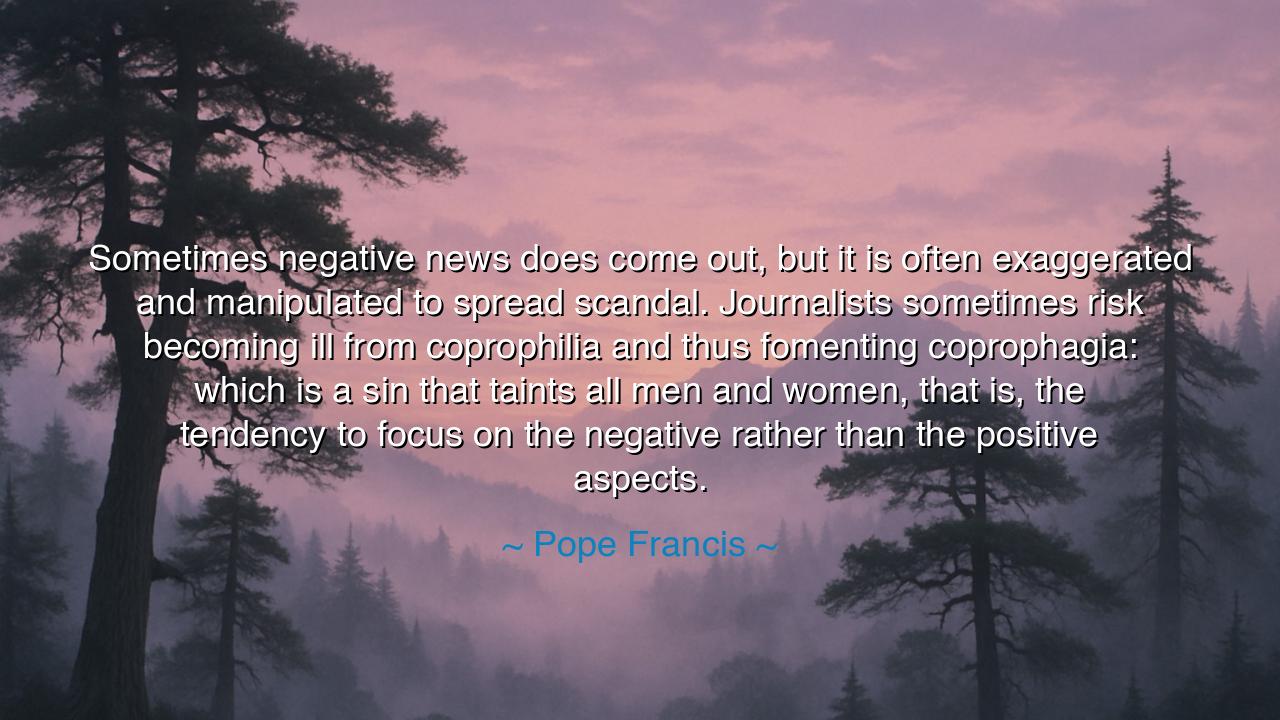
Sometimes negative news does come out, but it is often
Sometimes negative news does come out, but it is often exaggerated and manipulated to spread scandal. Journalists sometimes risk becoming ill from coprophilia and thus fomenting coprophagia: which is a sin that taints all men and women, that is, the tendency to focus on the negative rather than the positive aspects.






Hear the stern yet compassionate words of Pope Francis, shepherd of the faithful, who declared: “Sometimes negative news does come out, but it is often exaggerated and manipulated to spread scandal. Journalists sometimes risk becoming ill from coprophilia and thus fomenting coprophagia: which is a sin that taints all men and women, that is, the tendency to focus on the negative rather than the positive aspects.” Though cloaked in the strangeness of ancient terms, this is a teaching of eternal weight: that obsession with filth corrupts the spirit, and that to dwell endlessly upon scandal poisons not only the teller but the hearer as well.
The origin of this saying lies in Pope Francis’s reflections on the role of the media in the modern age. In a world filled with rapid communication, rumors, and scandalous revelations, he warned against the sickness of those who seek out only what is corrupt, ugly, or depraved. He used the harsh language of coprophilia—a morbid fascination with filth—to emphasize how destructive it is when men and women feast upon scandal and consume the degradation of others. In doing so, he reminded the faithful that such habits deform the heart, corrupting the soul that should instead hunger for truth, hope, and light.
History offers us vivid examples of this human weakness. Recall the French Revolution, when pamphleteers and scandal-mongers spread tales—some true, many exaggerated—about Queen Marie Antoinette. These stories, filled with salacious detail and twisted half-truths, inflamed the people’s rage and helped bring her to the guillotine. The scandal consumed her reputation before her body was ever condemned, proving Pope Francis’s warning: that obsession with the negative can destroy lives, fuel hatred, and blind entire nations to truth and mercy.
The deeper meaning of this teaching is that humanity’s appetite for destruction often outweighs its appetite for hope. To report the truth is noble; to unveil corruption is at times necessary. But to exaggerate, to sensationalize, to revel in decay—this is a form of sin, for it feeds despair rather than justice. It turns the heart inward, away from compassion, and trains the eye to seek only darkness. In this way, the media and the people alike risk becoming not heralds of truth, but merchants of shadows.
The lesson for us is clear: guard your mind against the allure of scandal. Recognize the temptation to feast upon gossip, upon rumors, upon the downfall of others. For though such tales may thrill for a moment, they poison the soul in the long run, breeding cynicism, bitterness, and hopelessness. Instead, seek out the positive, not as a denial of reality, but as a balance, as a reminder that alongside corruption there is also goodness, alongside scandal there is also virtue.
To the youth, I say: do not let your curiosity be enslaved by gossip, for it will rob you of joy. To the storytellers and journalists, I say: carry the sacred duty of truth with reverence; expose what must be revealed, but never taint it with exaggeration or mockery. To all, I say: remember that what you consume with your eyes and ears becomes food for your spirit—choose therefore nourishment, not poison.
Practical action lies before us: discipline your attention. Limit the time you spend feasting on negative news and instead seek stories of courage, resilience, and compassion. When confronted with scandal, ask yourself: does this help me grow in wisdom, or does it only feed my appetite for destruction? And when you speak of others, choose words that uplift rather than words that destroy.
Thus Pope Francis’s words endure: “The tendency to focus on the negative rather than the positive aspects taints all men and women.” Let this truth be passed down: the soul becomes what it consumes. If we fill ourselves with scandal, we become merchants of despair; but if we fill ourselves with truth and hope, we become beacons of light. Therefore, let us choose wisely what we see, what we share, and what we treasure—for upon such choices rests the health of our hearts and the strength of our world.






THTai Huu
The Pope's metaphor about journalists risking ‘illness’ through negative reporting is quite striking. But should we not be concerned with reporting on the dark sides of society if it leads to much-needed awareness and reform? How can journalists report on the negative without it becoming an unhealthy obsession?
0H09-Minh Hao
It's powerful to think about how the media’s focus on negativity can be likened to a kind of illness, spreading harm in society. But what if focusing on the negative is necessary to bring about awareness and change? How do we draw the line between critical reporting and just sensationalizing everything?
TLThu Thao Le
The Pope’s comparison of negative journalism to a 'sin' makes me think—can journalists ever strike a balance between highlighting crucial problems and fostering hope? How much responsibility do we have as consumers of news in curbing the spread of negativity? Should we demand more positive, solution-oriented journalism?
TTThanh Thao
Pope Francis uses strong imagery to describe how focusing on the negative can become an unhealthy obsession, even a ‘sin.’ How do we, as consumers of media, avoid falling into this trap? Is it possible for media outlets to remain responsible while still engaging in the hard-hitting reporting that people expect?
Hhey
This quote highlights a deep issue with modern media—how negativity can often be manipulated to create scandal. But could this constant focus on the negative actually be contributing to a collective sense of anxiety or distrust? Shouldn't journalists work towards uplifting stories that also challenge us in constructive ways?